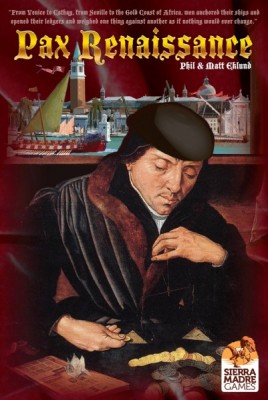One of the most famous magic items in Dungeons and Dragons is the bag of holding. On the outside, a small cloth bag. On the inside, a pocket dimension capable of storing huge amounts of stuff. Pax Renaissance is the closest real-world equivalent that we have. On the outside, a small box, no bigger than a couple of packs of playing cards. On the inside, one of the densest, biggest games we've seen this decade.
Your first clue comes from the rulebook, which is uncommonly thick for such a small box and printed in tiny font. It explains that players take the role of Renaissance era financiers, pulling political strings to make things happen. Each game re-tells the whole history of the Renaissance over 1-2 hours and can end in various ways, including a retreat into feudalism. The key to this is that there are several victory conditions, and players can choose to unlock one or more of them during the game. It then proceeds to deluge you in a forceful flood of complex minutiae, the like of which I've never seen before.
This is the third in the Pax series, but the first I've played. So I can't comment on whether prior experience helps you understand what the game throws at you. All I can say is that the first game is likely to take a lot longer than the stated time, and will feel like you're drowning in ludical treacle. Eklund games are typically simulations and have tended to draw on hard, factual concepts like evolution and space flight. The Pax games, by contrast, are history games. Yet you can see the attempt to cram incredible detail into the game, to try and make it into as much of a simulation as possible, at every turn. From the complexity of the rules to the dense historical flavour text on every card, it tries as hard as it can to convince you of its thesis.
Renaissance-era games are nothing new. Most posit that the key drivers of the era were either military or economic. Pax Renaissance's thesis takes a step back from these and says that what pushed the politics of the era was simple self-interest. The desire of the burgeoning middle and upper-middle classes to become rich through trade. In doing so it introduces a flood of novel ideas, from the tiny hand size to the way you slowly build and repeatedly re-use cards in your tableau. Although full of invention it does, of course, draw on previous Pax titles.
Play proceeds by players acquiring and playing cards. Many have a one-shot effect but then end up in the player's tableau. At first, play is likely to revolve around securing income from the two trade routes on the map, one running east and the other west. There are various ways to do this. These range from cashing in on the flow of goods as they pass to pulling political strings which change the geography of the flow itself.
Trade is just the tip of the historical iceberg on offer, however. The east-west dichotomy pervades the game. Its card-based map is divided into east and west sections, which start out Islamic and Catholic respectively. There are chess-like pieces on the map, representing nobility and armed forces, their colour indicating their religion. It's far harder to influence these pieces directly than it is trade, but the payoff can be much more spectacular. Rather than lining your pocket with a few Florins, you might set in motion the chain of events that lead to the Reformation. Or perhaps a peasant rebellion, a new crusade, another spurt of life for the Roman empire.
All these things - and more - are possible. It's a staggering, overwhelming, interlocking of systems. You can almost imagine the butterfly off the board, flapping its wings and starting to build a hurricane over Europe. Except you and your fellow players are the butterflies. And together your actions have the potential to change history. The scope of the game is almost as immense as the rulebook.
Interaction is at the heart of what makes the game fascinating. Your scope for individual actions each turn are very limited. So you've got to use them to full effect, launching your own schemes while trying to counter those of your opponents. As the game develops, you'll begin to see ways you might secure one or more of those victory conditions, all of which start locked. In an ideal world you'll beguile another player into actually unlocking one and making it a valid route to win. But maybe you'll have to do it yourself. Some are easier than others and they, of course, will be chased by more players. So there's a whole layer in merely choosing which to go for.
On the other hand, the price of entry is enormous. After devoting considerable effort to learning and teaching and playing enough for a review, there are still many aspects of the rules hard to ingest and remember. It seems almost impossible anyone could internalize enough to get the game down to the promised hour's play time. Even if you could, the options on offer can be overwhelming. So much so that I've seen several winners profess bafflement as to how, exactly they managed to get there.
There's also a question mark over the game's historical foundation. I'm no detailed student of history, but it doesn't seem hard to look back and imagine how merchants and bankers influenced kings and queens. How they might have influenced religious thinkers like Martin Luther seems a far bigger stretch. Yet that's what the game wants you to believe. To the point where the mercantile houses of Italy could have turned all Europe into part of the Ottoman Caliphate in their pursuit of profit.
Regardless of how you feel about the history, there's little doubt that Pax Renaissance is an absorbing game and an incredible achievement. To have a game of such vast scope is astonishing in itself, let alone to fit it into such a tiny package. Yet the looks belie the beast within. This is not the sort of small box game you just pick off your shelf and play. It demands too much effort to learn and play and play effectively. If you have enough hours to dedicate to it, it feels like it will reward your effort handsomely. But as ever with games like this, the question is the same: do you really want one game for one group that you could potentially play forever? Be careful what you wish for.
 Games
Games How to resolve AdBlock issue?
How to resolve AdBlock issue? 




























